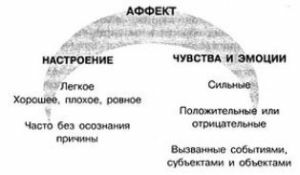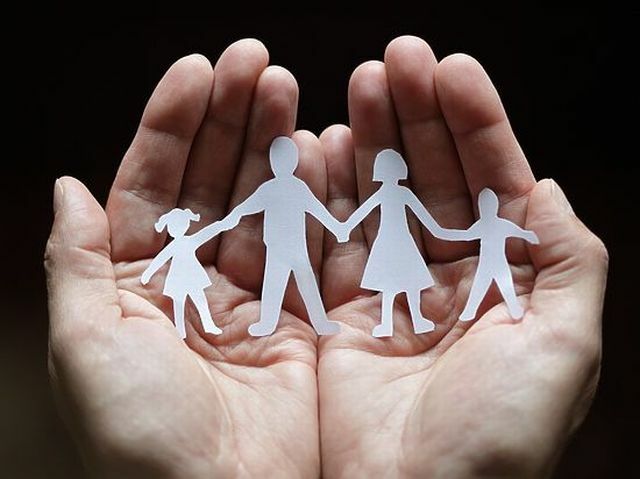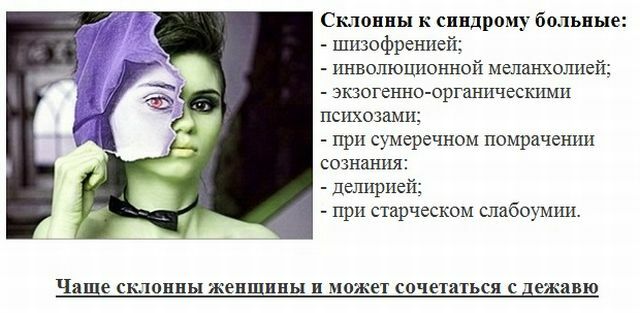 The life of people is filled with many states, which are often expressed by actions and behavior. The person's experiences are reflected by his emotions, which convey the reaction of the body to various stimuli. This applies both to changes in the surrounding reality and to people.
The life of people is filled with many states, which are often expressed by actions and behavior. The person's experiences are reflected by his emotions, which convey the reaction of the body to various stimuli. This applies both to changes in the surrounding reality and to people.
There are a lot of emotions in a person. They can be positive and negative, adequate and pathological. The latter manifest themselves in such a way that one can notice an increase in mood and a decrease in mood. It is to pathological emotions that affect, which is also characterized by pronounced reaction with its excessive manifestation of non-verbal nature.
Contents
- Concept of affect and description
- Causes and pathogenesis
- Symptoms of condition
- Current classification
- Pathological affect
- Physiological form of violation
- The concept of affect in criminology
The concept of affect and description
Affect is a strong experience formed when a person can not find a way out of a critical situation.
Such a state provokes inhibition of other processes at the psychic level, and also realizes behavioral reactions corresponding to this manifestation.
Strong emotional experiences in this state lead to the fact that the mind becomes narrower and the will is limited. After experiencing disturbances, special complexes can be observed, the triggering of which takes place without realizing the reasons that caused such a reaction.
This concept can also be found in judicial practice. A person in this state can be a serious danger in society, and  acts as an antisocial act. From a medical point of view, the state of affect is defined as the loss of control over emotions at the time of psychoemotional arousal.
acts as an antisocial act. From a medical point of view, the state of affect is defined as the loss of control over emotions at the time of psychoemotional arousal.
Behind each person in a state of passion, in the company of other people, one could observe anger, tears or reddening of the face. And after a while, he thought about returning time and changing everything about his behavior. This can happen to everyone, and there is nothing shameful about this.
Causes and pathogenesis of
A person experiences a state of affect in the event of any traumatic situation, in an unpleasant conversation with the interlocutor or as a result of induced negative emotions. Among the many factors that can provoke this behavior, psychologists distinguish such common causes:
- is a dangerous situation that threatens a person and can harm him( this includes direct and indirect threats);
- conflict between two or more persons, as well as the situation caused by excessive emotions;
- lack of time, due to the need to respond quickly in critical moments;
- acts of other people, affecting personal self-esteem and, thus, traumatizing feelings of a person;
- memories, negatively affecting a comfortable existence;
- features of the individual regarding his nervous system and psyche( stability, strength);
- increased emotions and impulsivity;
- regular repetition of events traumatic to the psyche;
- unexpected stimulus actions when a person does not have a specific action plan.
Symptomatic state
Affect, like many emotional reactions, accompanies a number of specific signs. In addition, that in many respects their manifestation depends on the type of affect, they also distinguish the general, which are divided into two categories: mandatory and additional.
The first group of features includes:
- unexpected manifestation of an event that is psychotraumatic, which causes subjective experiences;

- explosive emotions caused by the response;
- sudden appearance of a state of affect;
- narrows consciousness( perception occurs in fragments, the occurrence itself represents not the integrity of the picture, personal actions and what is happening around are also perceived by the fragments);
- mental and physical exhaustion.
Additional symptoms of affect include:
- negative emotional disorders: chronic fatigue, disturbed sleep, fatigue, the onset of certain diseases;
- sensation of despair;
- is partially disturbed by consciousness, speech and motor skills;
- lost the sense of reality, everything around is perceived in a distorted form.
In addition, the signs of affect are divided into:
- Internal - the person is as if disconnected from reality;lost sense of time and the perception of space;the connection with consciousness is broken;there is fear and anxiety.
- External .This includes posture, facial expressions, timbre of voice, intonation and others.
Modern classification of
The affect specialists are divided into the following types:
- Pathological .It wears a short-term character, while the mind becomes turbid, control over behavior is completely lost.
- Physiological .The condition is completely sane, but it is accompanied by serious limitations in consciousness. Man controls his actions and gives them an account.
- Affect the inadequacy of .The defensive reaction to failure manifests itself too violently. As a rule, there is anger, hysteria, anger.
Pathological affect
 This kind of pathology belongs to the group of neurological disorders and is characterized by uncontrollable crying, laughing and other manifestations caused on an emotional background. Often, this condition is secondary to a brain injury or neurological disease.
This kind of pathology belongs to the group of neurological disorders and is characterized by uncontrollable crying, laughing and other manifestations caused on an emotional background. Often, this condition is secondary to a brain injury or neurological disease.
A patient without an emotion exhibits an emotion that can not be controlled. Also, it can be a reaction in response to something that is not comparable to the importance of the cause that can lead to such a disorder. As a rule, in this state a person can not stop for several minutes.
In addition, emotions may not correspond to the surrounding reality. For example, a patient is able to laugh at a time when he is angry.
In addition, there are factors that can increase the likelihood of this kind of affect:
- psychopathy;
- traumatic brain injury;
- neurotic disorders;
- addiction and alcohol dependence;
- substance abuse.
The development of this condition is also susceptible to people without such pathologies, but having an increased reaction to stressful situations. The consequence of this may be, improper diet, overwork, lack of sleep.
In many cases, the "accumulation effect" plays an equally important role. Negative emotions accumulate for a long time, but at the same time they come out in the form of pathological affect. Usually, they are directed towards the person with whom the conflict is taking place.
According to doctors, this condition lasts only a few seconds. During this time a person can show an abnormal strength and behavior for him.
Specialists pathological affect divided into 3 phases:
- Preparatory .During this period, there is an increase in emotional tension, a change in the perception of reality and a violation of the ability to adequately assess the situation. Consciousness is concentrated only on a traumatic experience.
- Explosive .This stage is characterized by aggressive actions. In addition, you can observe a sharp change of emotions - from rage to despair, from anger to bewilderment.
- Final .There is a depletion of strength, both mental and physical. Suddenly, there may be a desire to sleep or a state of total indifference to what is happening.
A forensic examination is carried out to confirm the diagnosis. In the process of diagnosis:
- carefully study the patient's life history, features of his psyche;
- if there are witnesses, their testimony confirming clearly inadequate actions committed at the time of the alleged affect is considered.
The decision on the application of treatment measures in each case is taken individually. Since such a state is short-lived, after its termination the patient returns to its normal state.
In the absence of any mental disorder, there is no need for treatment. When identifying abnormalities, appropriate therapeutic procedures are carried out.
Physiological form of violation
This type of condition provides for the moment that a person is not considered insane. Such an action on the emotional background is not  refers to the disease, and consists in an explosive reaction( positive or negative) to the stimulus. Occurrence occurs instantly, its course is rapid, and manifestations are characterized by a change in the patient's mental equilibrium and deeds.
refers to the disease, and consists in an explosive reaction( positive or negative) to the stimulus. Occurrence occurs instantly, its course is rapid, and manifestations are characterized by a change in the patient's mental equilibrium and deeds.
Man is able to control and realize everything he does. There is no clouding of consciousness, memory is in a normal state and there are no twilight effects.
Among the reasons are:
- conflict;
- a threat to the life of a person or his relatives;
- negative behavior towards the person, consisting in an insult, which leads to a decrease in self-esteem.
You can observe such states only in some annoying situations. However, it should be noted that such a reaction is often not comparable to the real threat, and can depend on such factors as:
- age;
- self-assessment;
- state of the nervous system;
- fatigue, menstrual period, insomnia.
Affective states are accompanied by the following characteristic features:
- transience;
- intensity;
- sharpness;
- aggression, unjustified cruelty;
- state of exhaustion, sometimes partial loss of memory.
As a rule, physiological affect does not require treatment, since it is a short-term reaction that does not cause psychotic changes in human activity.
The concept of affect in criminology
In the Criminal Code, crimes are divided into committed crimes with mitigating and aggravating circumstances. Taking this fact into account, we can say that killing or causing harm to health in a state of affect refers to mitigating factors.
It is possible to attribute the affect to a criminal action only when a sudden excitement arises against the background of violence, bullying, immoral behavior towards a person and other unlawful acts.

However, it is worth mentioning that the situation that provoked such a state should be a real and not an imaginary subject.
It must be remembered that certain forms of affect can be controlled. But training of consciousness and upbringing of self-control is important here.
When a person is close to a state of nervous breakdown, but his mind is still able to reason, you can try the following:
- try to find the measures that contributed to the change in the situation;
- all thoughts to focus on how to keep your reaction as long as possible( well counts or breathing exercises well);
- try to focus on anything, except for the object that provokes the affect.
In special cases, such training is unlikely to help. It already requires the help of a psychotherapist or even drug therapy.



